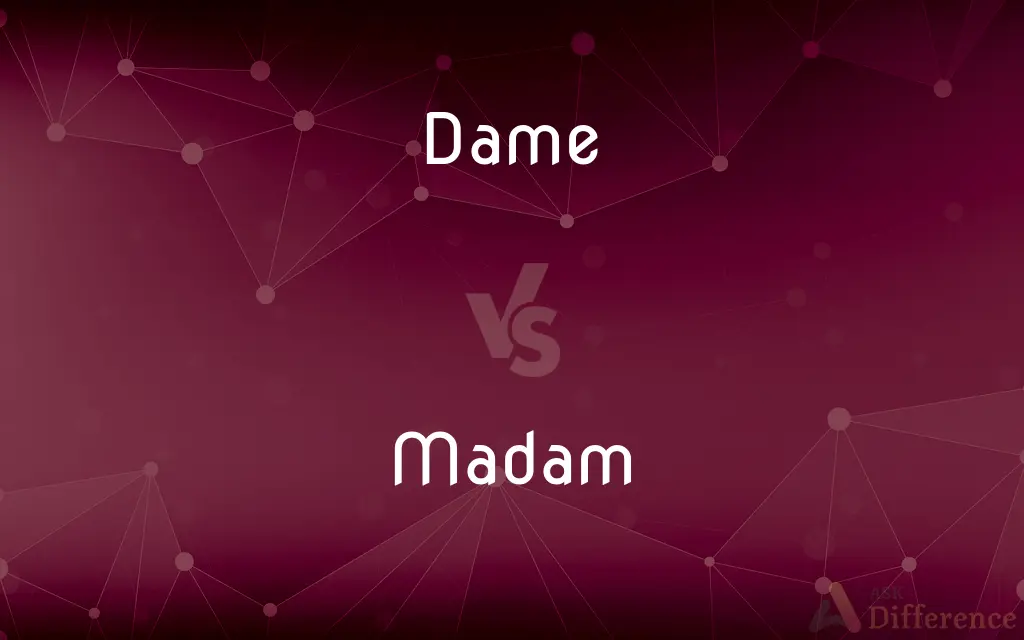Dame vs. Madam — What's the Difference?
By Urooj Arif & Maham Liaqat — Updated on March 19, 2024
"Dame" is a title of honor for a woman, equivalent to "Sir" for men, used primarily in British honours, whereas "Madam" is a polite form of address for women, often used to denote respect or authority.

Difference Between Dame and Madam
Table of Contents
ADVERTISEMENT
Key Differences
The term "Dame" is traditionally used as a title in the United Kingdom and certain Commonwealth countries, bestowed upon women as a recognition of their contribution to various fields, akin to the title "Sir" for men. On the other hand, "Madam" is a more general term used globally as a form of polite address for women, particularly those of higher social status or in positions of authority, and does not necessarily denote a title of honor.
Damehood is awarded as part of the British honours system and is one of the highest honors a woman can receive, recognizing significant achievements in various sectors such as arts, sciences, public service, and more. Whereas, "Madam" can be used in both formal and informal contexts, from addressing the female head of a household to women in professional settings, such as in business or education, without implying a specific achievement.
The use of "Dame" is relatively restricted and formal, often preceding the recipient's name in official and ceremonial contexts, signifying their distinguished status. Madam, however, is versatile, used in everyday language, ranging from respectful salutations in correspondence ("Dear Madam,") to addressing female officials, such as "Madam President" or "Madam Chairwoman".
While "Dame" is a specific title that is permanently associated with the recipient's name, "Madam" is a temporary form of address that changes based on the context and the woman's role or position at any given time. For example, a woman may be addressed as "Madam" in her professional capacity but not in her personal life.
Culturally, the title "Dame" carries a sense of national pride and recognition within the Commonwealth realms, symbolizing a lifetime of service and excellence. "Madam," however, transcends cultural boundaries and is widely used across the globe as a sign of respect and politeness toward women, without the connotations of a formal accolade.
ADVERTISEMENT
Comparison Chart
Nature
Formal title of honor
Polite form of address
Usage
UK and Commonwealth, for distinguished achievements
Global, in respectful address to women
Context
Official and ceremonial
Formal and informal settings
Association
Permanent with the individual's name
Contextual and temporary
Cultural Significance
National pride and recognition in the Commonwealth
Universal sign of respect and politeness
Compare with Definitions
Dame
A title conferred on a woman equivalent to the knighthood in Britain.
Dame Judi Dench is renowned for her contributions to the performing arts.
Madam
A polite form of address for women, often indicating respect or authority.
Madam Chair, may I present the next item on the agenda?
Dame
A title denoting honor and achievement in various fields.
Dame Mary Berry was honored for her services to culinary arts.
Madam
Often used to address female officials in positions of authority.
Madam President addressed the assembly with confidence.
Dame
Used before the name of a woman with the rank of dame.
Dame Helen Mirren received numerous accolades for her acting.
Madam
A term of respect used in formal correspondence.
Dear Madam, your application has been processed.
Dame
Reflects a woman's distinguished contribution to society or her profession.
Dame Vivienne Westwood was celebrated for her innovation in fashion.
Madam
Used to address or refer to a woman in charge of a business or household.
Please inform Madam that the guests have arrived.
Dame
A formal title used in addressing or referring to a woman who has been awarded a damehood.
Dame Maggie Smith has a distinguished career in film and theater.
Madam
Reflects politeness and respect in addressing women in various contexts.
Madam, your table is ready.
Dame
Dame is an honorific title and the feminine form of address for the honour of damehood in many Christian chivalric orders, as well as the British honours system and those of several other Commonwealth countries, such as Australia and New Zealand, with the masculine form of address being sir. It is the female equivalent for knighthood, which is traditionally granted to males.
Madam
Madam (), or madame ( or ), is a polite and formal form of address for women, often contracted to ma'am (pronounced in American English and in British English). The term derives from the French madame (French pronunciation: [maˈdam]); in French, ma dame literally means "my lady".
Dame
Used formerly as a courtesy title for a woman in authority or a mistress of a household.
Madam
Pl. Mes·dames (mā-dăm, -däm) Used formerly as a courtesy title before a woman's given name but now used only before a surname or title indicating rank or office
Madam Ambassador.
Dame
A married woman; a matron.
Madam
Used as a salutation in a letter
Dear Madam or Sir.
Dame
An elderly woman.
Madam
Madam Used as a form of polite address for a woman
Right this way, madam.
Dame
Often Offensive Slang A woman.
Madam
Madam The mistress of a household.
Dame
A woman holding a nonhereditary title conferred by a sovereign in recognition of personal merit or service to the country.
Madam
Madam A woman who manages a brothel.
Dame
The wife or widow of a knight.
Madam
A polite form of address for a woman or lady.
Mrs Grey wondered if the outfit she was trying on made her look fat. The sales assistant just said, “It suits you, madam”.
Later, Mrs Grey was sitting in her favourite tea shop. “Would madam like the usual cream cakes and patisserie with her tea?” the waitress asked.
Dame
Used as the title for such a woman.
Madam
The mistress of a household.
Dame
(Britain) Usually capitalized as Dame: a title equivalent to Sir for a female knight.
Dame Edith Sitwell
Madam
(colloquial) A conceited or quarrelsome girl.
Selina kept pushing and shoving during musical chairs. The nursery school teacher said she was a bad-tempered little madam.
Dame
(Britain) A matron at a school, especially Eton College.
Madam
(slang) A woman who runs a brothel, particularly one that specializes in finding prostitutes for rich and important clients.
After she grew too old to work as a prostitute, she became a madam.
Dame
In traditional pantomime: a melodramatic female often played by a man in drag.
Madam
An irritable, conceited, or contemptous woman. (used as a general term of abuse).
Dame
A woman.
Madam
(transitive) To address as "madam".
Dame
(archaic) A lady, a woman.
Madam
A gentlewoman; - an appellation or courteous form of address given to a lady, especially an elderly or a married lady; - much used in the address, at the beginning of a letter, to a woman. The corresponding word in addressing a man is Sir; often abbreviated ma'am when used as a term of address.
Dame
A queen.
Madam
The woman who is in charge of a household.
Dame
To make a dame.
Madam
The woman who is in charge of a brothel.
Dame
A mistress of a family, who is a lady; a woman in authority; especially, a lady.
Then shall these lords do vex me half so much,As that proud dame, the lord protector's wife.
Madam
A woman of refinement;
A chauffeur opened the door of the limousine for the grand lady
Dame
The mistress of a family in common life, or the mistress of a common school; as, a dame's school.
In the dame's classes at the village school.
Madam
A woman who runs a house of prostitution
Dame
A woman in general, esp. an elderly woman.
Dame
A mother; - applied to human beings and quadrupeds.
Dame
Informal terms for a (young) woman
Dame
A woman of refinement;
A chauffeur opened the door of the limousine for the grand lady
Common Curiosities
How is a "Dame" chosen?
Dames are chosen through a nomination process, recognizing their exceptional contributions to their field or society.
Can anyone be addressed as "Madam"?
Yes, "Madam" is a general term of respect and can be used to address any woman, particularly in formal or professional contexts.
Is "Dame" a hereditary title?
No, "Dame" is not hereditary; it is awarded to women for their individual achievements.
Can a non-British citizen become a Dame?
Non-British citizens can receive honorary damehoods, recognizing their contributions to the UK or in international fields.
Is "Madam" used only in professional settings?
"Madam" can be used both in professional settings and as a polite form of address in various social contexts.
Is "Madam" used in all English-speaking countries?
"Madam" is widely understood and used in English-speaking countries, though its usage can vary based on local customs and formality levels.
Are there any equivalent titles to "Dame" in other countries?
Other countries have their own systems of honor, but "Dame" is specific to the British honours system and certain Commonwealth countries.
How does one address a Dame?
A Dame is typically addressed as "Dame [First Name]," for example, "Dame Helen."
Is it appropriate to use "Madam" in casual conversations?
While "Madam" is more formal, its use depends on the context and cultural norms; it might be too formal for casual conversations.
How has the use of "Madam" evolved over time?
The use of "Madam" has evolved from a term denoting higher social rank to a more general form of respectful address for women.
What is the male equivalent of "Dame"?
The male equivalent of "Dame" is "Sir," which is used for men who have been knighted.
Can "Madam" be abbreviated in any form?
"Madam" is sometimes abbreviated as "Mme" or "Mdm" in written correspondence, but this is less common in English.
Can "Dame" be used in a non-titular sense?
Traditionally, "Dame" is used as a title, but it can sometimes be used informally or affectionately to refer to a woman.
How does one become nominated for a damehood?
Individuals are nominated for damehoods by the public or professional bodies, and nominations are reviewed by committees and the monarch.
Are there different ranks within the title of "Dame"?
The title of "Dame" is associated with the two female orders of chivalry: Dame Commander of the Order of the British Empire (DBE) and Dame Grand Cross (GBE).
Share Your Discovery

Previous Comparison
Preen vs. Prowl
Next Comparison
Civilization vs. SocietyAuthor Spotlight
Written by
Urooj ArifUrooj is a skilled content writer at Ask Difference, known for her exceptional ability to simplify complex topics into engaging and informative content. With a passion for research and a flair for clear, concise writing, she consistently delivers articles that resonate with our diverse audience.
Co-written by
Maham Liaqat














































